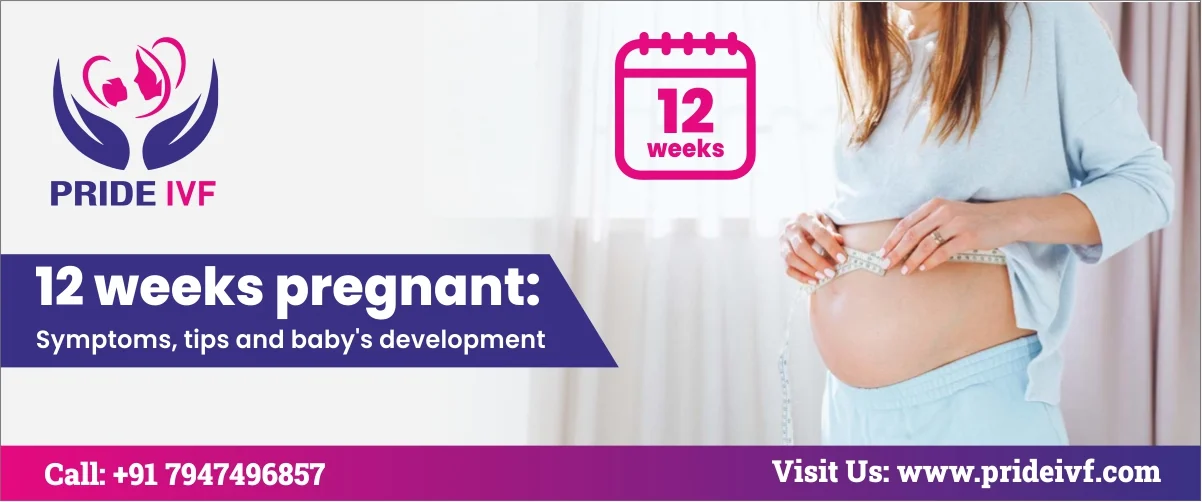Warmest congratulations! It’s exciting to announce that you are 12 weeks pregnant. By now, the first trimester is almost over, and your baby has experienced remarkable growth and development. At this crucial point in your pregnancy, the baby you’re expecting has already experienced incredible growth and development, and you’re starting to used to your new routine as an expectant parent. Understand the more information about 12 week pregnancy symptoms in the blog.
Journey So Far
Looking back on the journey so far, you may have gone through the ups and downs of early pregnancy symptoms, from the initial excitement and maybe some anxiety to managing the fluctuations of fatigue, morning sickness, and hormonal shifts. At 12 weeks pregnant, you might notice that your energy level has increased as the nausea fades and you start to feel excited about the future.
Looking Ahead
It appears that more developments and significant achievements will made in the upcoming days, weeks, and months. Your baby is developing quickly, and new things happen every day, like the emergence of tiny fingernails and the definition of facial features. You’ll have time to spend connecting with your child, organizing prenatal care, and learning about the pleasures and difficulties of pregnancy as you get ready for the second trimester.
We’ll explore the different aspects of being 12 weeks pregnant in this blog post posted by an expert team of Pride IVF covering a variety of subjects to help you through this life-changing period. We’ll talk about typical symptoms you might experience, useful coping mechanisms for discomforts, developmental milestones for your baby, and advice on managing medical care and mental health.
This blog here to support you on your journey, whether you’re interested in learning more about prenatal nutrition, getting ready for prenatal visits, or just need some peace of mind and knowledge.
Symptoms of a 12-Week Being pregnant
As the pregnancy goes on, you might notice physical changes in your body and have a range of symptoms:
- Decreased Nausea: As hormonal fluctuations stabilize around the 12-week mark, many women find that morning sickness (vomiting and nausea) begins to improve.
- Improved Energy: As your body adapts to the pregnancy hormones and your energy levels rise, you may start to feel less exhausted.
- Breast Changes: Your breasts might have gotten bigger and still feel tender. Some women report that their nipples have become darker.
- Skin Changes: Hormonal changes may cause changes in your skin, such as acne or a pregnancy “glow.”
- Round Ligament Pain: This is a mild form of lower abdominal pain or cramping that you may get as your uterus grows.
- Emotional Shifts: Hormonal fluctuations can lead to mood swings, which can occasionally make you feel more sensitive or agitated.
Tips on Dealing with Symptoms
You can feel more at ease and enjoy this stage of pregnancy if you manage your symptoms:
- Balanced Diet: Keep your emphasis on a diet full of whole grains, fruits, vegetables, lean meats, dairy products, and other nutrients. Blood sugar levels can stabilized and nausea can be controlled with frequent small meals.
- Remain Hydrated: To promote general health and stay hydrated, drink lots of water. Headaches and weariness are among the symptoms that dehydration can worsen.
- Gentle Exercise: To enhance circulation, elevate mood, and preserve fitness, partake in mild exercise like swimming, walking, or prenatal yoga. Before beginning any new exercise regimen, always get advice from your healthcare provider.
- Relaxation and Rest: Pay attention to your body and make rest a priority. In order to manage fatigue and enhance wellbeing, getting enough sleep and taking breaks during the day are beneficial.
- Emotional Support: Rely on your network of friends, family, and/or partners for support. During this period of transition, talking about your feelings and worries can reduce stress and offer emotional support.
Baby’s Development at 12 Weeks Pregnant
As you go through these changes, your baby is going through incredible growth and development:
- Size: Your unborn child is roughly the size of a plum at 12 weeks pregnant, with a crown to rump measurement of 2.1 inches (5.4 cm).
- Organ Development: Your baby’s heart has split into four chambers and is beating rhythmically. Major organs like the liver, kidneys, and intestines are now operational.
- Facial Features: Your baby’s eyes are getting closer together, and tiny ears are starting to form on the sides of their heads. Their faces are starting to become more defined.
- Movements: Your unborn child is kicking and moving inside your uterus, practicing reflex actions like swallowing and sucking, even though you won’t be able to feel it yet.
- Genitalia: Your baby’s genitals should have developed by now, but in many cases, it may still be too early to use an ultrasound to confirm the sex.
Throughout the course of your pregnancy, you might feel a variety of emotions:
- Excitement: Realizing that you are well into the second trimester can cause you to feel eager to meet your child.
- Relief: Since the chance of miscarriage dramatically drops after the first trimester, many women experience a sense of relief.
- Connection: As they learn more about their child’s growth and development, some women report feeling a deeper emotional bond with them.
- Anxiety: It’s common to worry about your unborn child’s health and the changes that pregnancy will bring about. You can ease your worries by speaking with your healthcare provider and keeping yourself informed.
Prenatal Visits and Medical Care
You might have significant prenatal checkups and screenings at 12 weeks pregnant:
- Nuchal Translucency (NT) Scan: To determine the likelihood of Down syndrome and other chromosomal abnormalities, this optional ultrasound scan measures the amount of clear space in the tissue at the back of your baby’s neck.
- Genetic Screening: To determine the likelihood of genetic disorders, your healthcare provider may talk to you about genetic screening procedures like non-invasive prenatal testing (NIPT).
- Prenatal Vitamins: To support your baby’s development, keep taking the prenatal vitamins prescribed by your healthcare provider. These vitamins contain folic acid and other vital nutrients.
Making Advance Plans
As you anticipate the remainder of your pregnancy, think about:
Birth Plan: Make a list of everything you would like to have during labor and delivery, including who you want to have with you, positions for giving birth, and methods for managing pain.
Maternity Leave: Start preparing for your maternity leave from work, as well as any postpartum care and support arrangements that may required.
Baby Registry: To plan for your baby shower and arrange your requirements for baby necessities, if you haven’t already, think about setting up a baby registry.
Conclusion
Reaching the 12-week mark in your pregnancy is a big step toward the second trimester. You can welcome this journey with confidence and excitement if you know what symptoms to expect, make healthy habits, and keep up to date on your baby’s development. Throughout your pregnancy, don’t forget to ask your healthcare provider for advice and personalized care. Savor this unique moment while you look forward to meeting your child in the coming months.
As you move into the next stage of your pregnancy, keep in mind that every day offers fresh
chances for development, growth, and connection. Have faith in your body’s capacity to bear new life and welcome the changes with excitement and wonder. As you eagerly await the arrival of your little one, stay informed, stay connected, and most importantly, cherish this amazing time.
However, in this whole journey always remember we the team of Pride IVF Centre in Delhi are together in this with you and walking along with you. In case you need us we are always there to assist you.
FAQs:
Q) Is it common for a 12-week improvement in morning sickness?
Yes, a lot of women discover that by the end of the first trimester—roughly 12 weeks—their morning sickness and nausea begin to lessen or go away entirely. This is a good indication that the second trimester is starting because it is caused by hormonal changes.
Q) At 12 weeks pregnant, what foods should I eat to support the development of my unborn child?
Prioritize a diet that well-balanced and abundant in whole grains, dairy products, fruits, vegetables, and lean proteins. Incorporate foods that are rich in vital nutrients like calcium, iron, folic acid, and omega-3 fatty acids. Steer clear of unpasteurized dairy, undercooked or raw meats, and too much caffeine.
Q) At twelve weeks pregnant, what size is my baby?
Your baby is about the size of a plum, with a crown to rump length of 2.1 inches (5.4 cm).
Q) At around 12 weeks pregnant, which prenatal tests are advised?
You might undergo a nuchal translucency (NT) scan at 12 weeks to determine your risk of chromosomal abnormalities like Down syndrome. Options for genetic screening, such as non-invasive prenatal testing (NIPT), may also discussed by your healthcare provider.
Q) Is traveling while twelve weeks pregnant safe?
In general, the second trimester (weeks 14–28) is safe to travel during because many pregnancy symptoms have improved and the risk of miscarriage is lower. But before you book a trip, always consult your doctor, particularly if you have any pregnancy-related issues or concerns.




